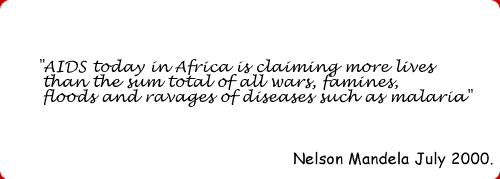Other useful websites
on HIV/AIDS:
www.world-corner.org
www.undp.org/hiv
www.avert.org.uk
www.actionaid.org
|
|
Left unchecked, the spread
of HIV/AIDS could have devastating effects on the long-term
development of Southern Africa. However, solutions do exist,
and we can all learn from the current situation.

 for
AIDS Fact File for
AIDS Fact File
Why Southern Africa?
The reasons why
southern Africa has been hardest hit by AIDS are linked to
economic development in the region. Large numbers of people,
particularly young men, migrate to cities in search of work.
Away from home, there is a greater chance of infection by
sleeping with more partners. Because of low levels of education,
many migrants do not know how they can be infected in the
first place.
Poverty makes the situation
worse. African countries currently pay four times more in
debt repayments than they spend on health and education. Without
proper health care, many poorer people with HIV die earlier
from diseases such as tuberculosis rather than AIDS because
they do not receive the treatment that would fight off these
diseases. Also, whilst there is no cure for AIDS, a cocktail
of drugs can slow the growth of the HIV virus. Recently, drug
companies cut the price of these drugs to the developing world
but the monthly bill is still $60 when the average income
in Sub-Saharan Africa is only $50 a month.
Cultural factors also
play a part in increasing infection rates. In some communities,
victims of the virus may be thrown out of their houses by
their families and lose their jobs. This discrimination stops
many people from seeking treatment for fear of being discovered.
Life Expectancy
changes as a result of AIDS 1995-2000

The Economy feels the
Impact
The immediate concern
is to treat those already ill, but hospital wards are already
at breaking point. 60% of South Africa's hospital beds are
taken up by AIDS patients. The impact of the virus is also
felt elsewhere in the economy. In factories, productivity
is dropping as workers with HIV are forced to take more days
off. In the fields, crops are left untended and unsold, and
in schools, falling numbers of teachers are causing class
sizes to rise.
The Missing
Generation
Unlike most infectious diseases, HIV is most common amongst
young adults, a situation that the world has never experienced
before. When a family is made up of only grandparents and
grandchildren, the 'dependency
ratio' increases because the productive members of the
family are no longer able to be the breadwinners. As a result,
families become poorer and a vicious cycle of poverty could
set in. To make ends meet, other family members have to give
up work or school to care for their sick relatives and dig
into the family budget to pay for health treatment.
The Population Pyramid
for Botswana for 2025 without AIDS.

Click
on the Pyramid to see how the population structure is likely
to change with AIDS if current predictions prove true.
What are the main differences between the two scenarios?
What will be the likely effects on the people and economy
of Botswana if the scenario with AIDS actually happens?
Fighting the Virus
|

�
Jorgen Schytte/Still Pictures.
Uganda's
campaign of open talk and health education has helped
the infection rate amongst adults drop from 14% to 8%
since 1987. Current facts and figures paint a very gloomy
picture, but there are signs of optimism. In Uganda
in 1987, President Museveni took the first step in recognising
the effects that the virus could have on his country's
future development.
|
Since then, community
organisations have embarked on a successful campaign to halt
the spread of HIV/AIDS. Using TV adverts, lessons in schools,
and song and dance activities for those that can't read, the
campaign has encouraged people to discuss sexual behaviour
in a way that is otherwise difficult and embarrassing but
also informs people of how they can avoid infection. At the
same time, the Ugandan campaign has promoted the human rights
of AIDS victims to fight the discrimination of those in need
of help.
Elsewhere,
organisations are helping people with HIV to rebuild their
lives, and supporting children orphaned by AIDS. Click on
the icons below to read about the work of Hope HIV and Voluntary
Services Overseas (VSO).


|





